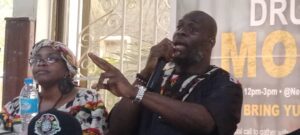By Alimamy Jalloh, Awoko Newspaper
Freetown, SIERRA LEONE – In a recent collaborative event at Grafton Community, the Universal Negro Improvement Association and African Community Liberation (UNIA-ACL), the Pan-African Union Sierra Leone (PANAFU-SL), and the Rastafarian Council united to emphasize the enduring legacies of Marcus Mosiah Garvey, the renowned civil rights activist and Pan-African leader. The panel aimed to inspire Africans worldwide to embrace Garvey’s principles and explore their relevance to contemporary issues in Africa.
Chief Foday Ajamu Mansaray, the Third Assistant President General of UNIA from the United States, shared insights into Garvey’s historic struggle for African liberation. Garvey, a Jamaican-born black nationalist, is celebrated for his efforts to unite people of African descent globally. Born on August 17, 1887, in St. Ann’s Bay, Jamaica, Garvey’s early life was marked by hardship. Despite his father’s role as a stonemason and his mother’s work as a household servant, only Marcus and one sibling survived to adulthood.

Garvey’s formative years were spent in Jamaica, where he faced racial prejudice from his white teachers. This experience fueled his activism and led him to establish the Negro World Newspaper and the Black Star Line shipping company. His advocacy for “separate but equal” status and his ambition to create independent Black states, particularly in Liberia, were cornerstones of his vision.
Mansaray highlighted Garvey’s significant contributions to Black pride, including coining the phrase “Black is beautiful.” He recounted Garvey’s imprisonment in Atlanta in 1925, from which he penned his influential “First Message to the Negroes of the World from Atlanta Prison.” Garvey’s declaration of unwavering support for African people, even beyond death, underscored his dedication to the cause of Negro liberty.
Garvey passed away on June 10, 1940, following complications from strokes. Despite his death, his legacy endures through his profound impact on civil rights and Pan-Africanism.
Elijah Issa Gegra, the Rastafarian Ambassador in Sierra Leone, addressed the panel with a critical perspective on Africa’s ongoing exploitation. He discussed the historical and contemporary impacts of colonialism, neo-colonial slavery, and mental enslavement perpetuated through Western education. Gegra emphasized the urgent need for Africa to reclaim its resources and sovereignty.
In a forward-looking statement, the Third President General of UNIA-ACL announced upcoming initiatives to honour Garvey’s vision. Plans include the construction of schools, the development of an African-centered curriculum, and broader efforts to revive Garvey’s mission in Sierra Leone and across the continent.
This event served as a poignant reminder of Marcus Garvey’s enduring influence and the continued relevance of his teachings in the struggle for African empowerment and development. AJ/31/8/2024

